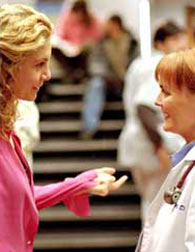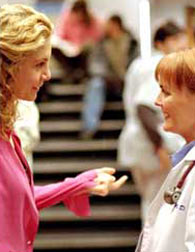When the producers of ER,America's number one television drama, decided last summer to introduce a lesbian story line, they called Laura Innes, the Emmy-nominated actress who plays Dr. Kerry Weaver, for a meeting.

Dr Legaspi (Elizabeth Mitchell) chats with Dr Weaver, played by Laura Innes (right)
Finally, they spilled it: the time was ripe for Dr. Weaver, County General Hospital's fiercely independent (and perpetually single) chief of emergency medicine, to get a little action, lesbian style.
"Wait a minute. You mean I'm gonna be gay?" Innes shot back. Then she started to laugh. "Why didn't you just say it?"
With this kind of open-minded ease, Innes set out to research what life is like for middle-aged women struggling with their sexuality. And she's translated all she's learned into a titillating and true-to-life portrayal.
"I think it's hard for anybody to come out, especially years ago," Innes muses. "But for somebody to live their whole life, then at age 40, go, 'Oh my god, I'm not who I thought I was,' that's tough."
GayHealth.com caught up with Innes to get the lowdown on lesbian life -- and love -- in the E.R.

Dr Legaspi (Elizabeth Mitchell) chats with Dr Weaver, played by Laura Innes (right)
The first thing I did was talk to some friends of mine who are gay and with a gay writer on the show. And then I spoke to a couple of lesbians who work in health care, who talked about the difficulty of coming out in their careers. They said it's hard enough to be a woman in the medical profession, and it's still fairly difficult to come out and not have it diminish your career -- especially if you don't work in a large city. This was a big issue for my character, Dr. Weaver, who always has this in the back of her mind because her job is such a huge part of her life.
Did you read up on the topic?
The most helpful thing actually was reading. The coming out stories were helpful, though I'd say the most helpful book of all was Married Women Who Love Women(Alyson Books). It's an anthology of true stories by women who've come out later in their lives. It was really moving and dramatic because the women talked about feelings that were very sweet and tender, like love, companionship and intimacy. And they had to make very courageous changes in their lives, sometimes leaving their marriages. They had children and career issues, and all kinds of things were at stake.
Did you feel any trepidation playing a gay character?
You know, I didn't. The producers called me in for a meeting, and they asked me to think about it. So I got in the car and called my husband. He said, "It sounds really interesting and dramatic and fun." And then I called my publicist, to see if there was some kind of downside, career-wise. And he said, "You know, I just don't think so. We're at a place now where there's no downside." My only concern was how my son, who's 10, would feel. I sat him down for a talk. And you know what? He absolutely had no idea why I was even bothering to tell him. He was like, "Yeah, and?" He was so far ahead of us in terms of feeling like it was no big deal.
Your character seems to send mixed signals to her love interest, Dr. Legaspi.
I've learned that the coming out process for somebody Dr. Weaver's age is incredibly slow.
There's enthusiasm, a sort of adolescent excitement, and then self-recrimination and pulling back. Dr. Weaver has dealt with this feeling of being on the outside her whole life. So all of a sudden, when it comes to her sexuality, she's thinking, "So I'm gonna do this again? I'm gonna be another disenfranchised part of society?"
What was Dr. Weaver thinking the first time she and Dr. Legaspi went out to dinner?
At first, Dr. Weaver just goes to have dinner with someone she's strangely fond of. But during the course of the meal, she's thinking, " I want to kiss this person!" The degree to which she's repressed is huge. Later, when she goes out to eat with Dr. Legaspi and her lesbian friends, Dr. Weaver at first is like, "Okay, I'm going to go out with these gay women." Then all of a sudden, she's thinking, "I don't want to label myself. I don't want to become part of a subculture." My gut feeling is that Dr. Weaver is trying really hard not to be gay. She puts all this energy into pushing these feelings down and turning them into something else. But she just keeps coming back to it.
Are you saying Dr. Weaver has fallen in love?
Her attraction to Dr. Legaspi is very strong, and I think that she's in love with her, yes.
In what ways do you hope your character impacts your millions of viewers?
Our first concern is telling good, dramatic stories, yet I personally -- and the show as a whole -- have always been interested in issues of tolerance. And tolerance toward gay people is a big one.
One of the things we do is reflect society in a way that's accurate. We're portraying this positive image of Dr. Weaver as a real person who's trying to be true to herself, and who with good will is living her life. We're saying that homosexuality is not something you need to feel afraid of, and it's not something that's different from you. Some people happen to be gay, that's all. It really shouldn't be an issue.
I mean, a straight man would never, for a moment, be able to even imagine somebody telling him, "No, you're not allowed to marry that woman who you love." But this is the reality for millions of gay people. I would hope that one of the things we do in telling our stories is to create more tolerance.
Some may accuse ER of crossing the line between entertainment and politics.
The truth is, it's not about politics. It has to do with the fact that people should be able to live their lives freely. It's ironic to me that there are so many people who feel more conservatively, who are so into libertarian thinking, independence and freedom from government intervention in their lives. Yet these are the same people who tell gay people, "Oh no, you can't do that."
What kind of feedback have you gotten from fans of the show?
The letters I get are very positive. People are enthusiastic and moved and excited to have their stories told, to see some kind of version of themselves reflected in such a mainstream show. People say, "This is really important that you're doing this. Thank you." And I get lots of little postcards that say, "You go, girl!"
Will Dr. Weaver come out to her colleagues in the E.R.?
We'll see. I think Dr. Weaver is closer to being truthful about who she is. But the layers of fear are there, and she's terrified about what will happen to her and how people will feel about her.
Can you give us a hint of how Dr. Weaver's love life will turn out?
Oh gosh. The truth of the matter is that we don't know what's going to happen for the long-term. All I can say is, Dr. Legaspi is coming back for the end-of-the-year episodes, and there's gonna be some good stuff between us.
